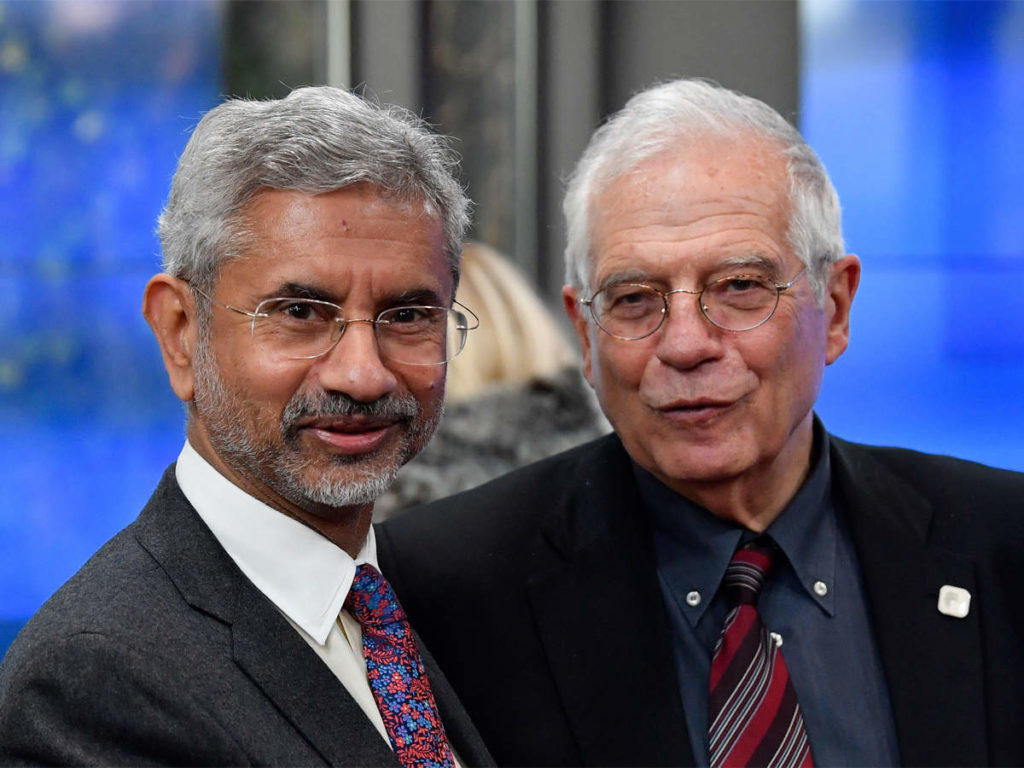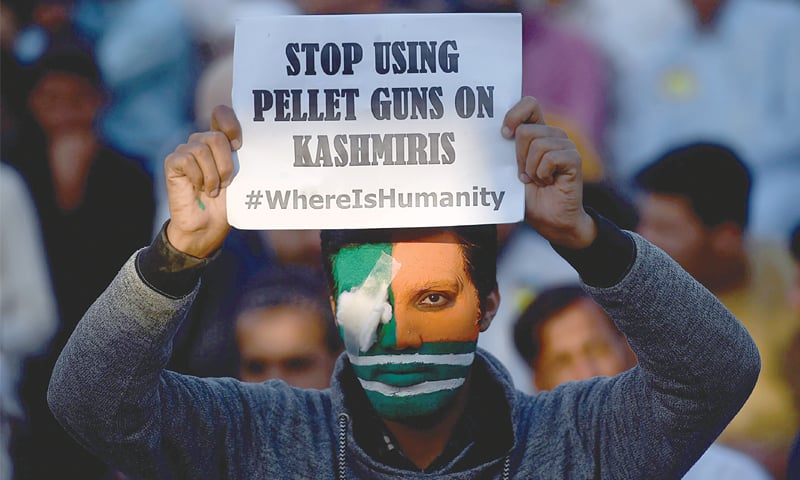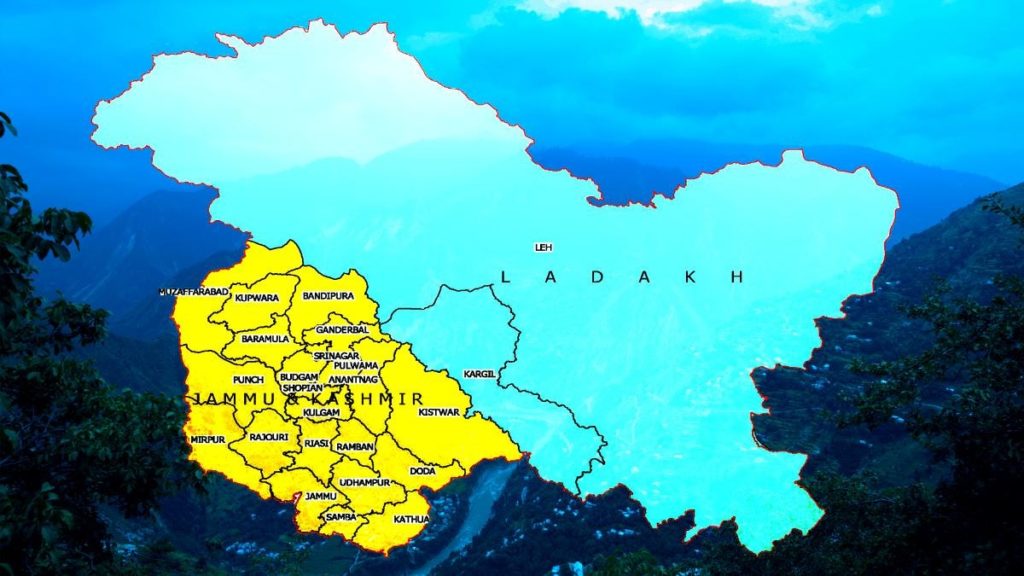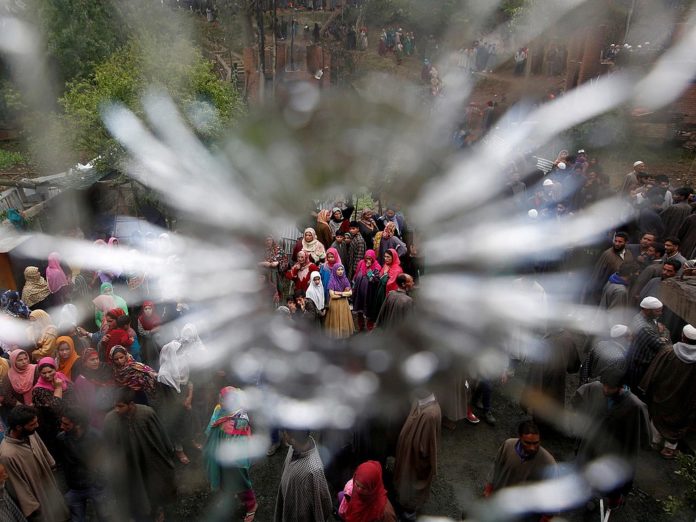Kashmir has been under Indian military siege for the last one month and so called western civilized world is still silent. Police or military barriers abound in both urban and rural areas, and intimidation is a rather common occurrence at these checkpoints in occupied Kashmir. The occupied Kashmir seethes with a repressed anger generated by the humiliating brutality inflicted by Indian troops. The conscious policy of the Prime Minister Modi and his cohort to revoke autonomy, downgrade the State and democratic institutions in J & K has further alienated the people of Kashmir.
Humanity is badly suffering and Kashmiris are dying because of hunger, thirst and medicine too. It has been constant denial of even basic necessities of life to common people. Curfew is still there to add miseries of common people.
Means of communications have not yet been restored and Kashmiris are still at the mercy of Indian brutal military and paramilitary power and propaganda too. Unfortunately, Kashmir, the heaven on earth has been easy prey of regional and global power politics. The elite global movers & shakers have now decided to transform Kashmir into profitable real estate project and hub of tourism. Era of proxies is over and Kashmir has been entered into a profitable proposition for the international investors especially from the Gulf Cooperation Council (GCC) and Arab world. Moreover, revoking of special status (Article of 370 & 35(A) of occupied Kashmir has some serious international political repercussions. It has jolted even regional power equation. China has severely rejected division of occupied Kashmir into parts especially Ladakh.
Thousands of security forces patrol the streets at checkpoints, and many high-profile political leaders in Kashmir continue to remain in detention. The Indian government has said that things remain calm in Kashmir. But videos, as well as media and eyewitness reports, dispute that claims.
Pakistan has been raising the issue on several international platforms, including approaching the UN and OIC. Prime Minister Imran Khan has also spoken to multiple world leaders and briefed them on the situation in Kashmir. While speaking to Islamic Society South America, he showcased the real face of the RSS and termed it a potential danger to South Asia. RSS inspired from the fascist regime of German Nazis which should be taken seriously by the world powers, he added. He feared that RSS doctrine may start a potential nuclear war in the region.
The government of Pakistan is now striving hard to get vital support from the so called Islamic world especially from the Arab world but unfortunately, goals for diplomatic support have not yet been secured due to many complicated and complex regional socio-economic, geo-political and geo-strategic emerging trends wherein, economics acts like a decisive variable/parameter.
The most recent visit of foreign ministers of the UAE and Saudi Arabia to Islamabad astonishingly demoralized diplomatic efforts of Pakistan by saying that Kashmir is not the issue of Muslim World. It is irony of international politics that human pains, prosecutions and perpetual denial of basic human rights do not have any sway and only profits, befitting propositions and vested interest dominate. Genocide of Bosnia in the heart of so called civilized Europe, Nagorno-Karabakh in the heart of South Caucasus, and Northern Republic of Turkish Cyprus in the heart of Mediterranean Basin speaks itself that in the wild chase of dirty power politics, religion, ethnicity, faith, caste, color and culture are secondary commodities. And now somehow, Kashmir has become a prime example of invisible regional hegemonic bargaining and international power politics. Kashmir the heaven on earth has become a “bleeding paradise” unfortunately.
Even OIC did not stand with the stance of Pakistan on Kashmir. Is it now a “reality check” on Kashmir? Does it an operationalized failure to foreign ministry of Pakistan? Only time will tell/ determine. Notwithstanding it a wake-up call for the government of Pakistan and of course the establishment.
But still there is a light of hope in the end of tunnel. The European Parliament’s Committee on Foreign Affairs (AFET) demanded the Indian government to immediately lift the curfew in occupied Kashmir that has created humanitarian crisis in the valley. It expressed serious concern over the continued lockdown, suspension of all communication means and media blackout in the occupied Kashmir. It strongly criticised India and condemned the Modi led government for its brutal action that has brought life to standstill in the valley.
Members of the European Parliament’s Committee on Foreign Affairs raised their voice for the oppressed Kashmiris, and demanded India to begin dialogue with Pakistan, adding that the European Union (EU) and the European Parliament should issue a reactionary statement on the situation in occupied Kashmir as soon as possible. The EU meeting took place despite Indian efforts to get it canceled. The European Parliament has passed resolutions in support of the Kashmiris. It also sent a delegation to the IOK, which gave an eye opening report. The delegates termed the IOK as “the most beautiful prison of the world”.

Indian External Affairs Minister S Jaishankar visited Brussels and met with High Representative of the EU for Foreign Affairs and Security Policy, Federica Mogherini. According to reports, the Indian minister tried to scuttle efforts to raise the issue of Kashmir in the European Parliament but failed.
Moreover, the US Congress’ Foreign Relations Committee House Subcommittee on Asia met and discussed human rights violations in Kashmir. Both committees discussed the ongoing curfew in Indian held Kashmir and situation in the valley. Reports coming out of the valley accuse the Indian government of mass imprisonments and human rights violations. India, however, claims everything is returning to normal.
The human rights violations perpetrated by the Indian security forces in the Indian occupied Kashmir (IOK) have evoked a worldwide condemnation. World leaders, governments, organizations, intellectuals, civil society have condemned this state terrorism in the IOK. Most recently, the Amnesty International India has launched a global campaign ”Let Kashmir Speak” to highlight the draconian communication blackout in Indian Held Kashmir, terming it an “outrageous protracted assault on the civil liberties of the people”.
The blackout has now been a month old and cannot be prolonged any further by the Indian Government as it has grossly impacted the daily lives of Kashmiri people, their emotional and mental well-being, medical care and access to emergency services,” said Aakar Patel, head of Amnesty International India in a statement.
The Amnesty International’s head said depriving a population of eight million of its right to freedom of expression, opinion and movement for an indefinite period is akin to taking the region back to the dark ages. The country is yet to hear from Kashmir after a month of being repeatedly been told by the Indian government that all is normal.
He said the current shutdown was against the Article 19 of the International Covenant on Civil and Political Rights, to which India was a party.
He mentioned that sketchy reports coming out of the region had highlighted unattended medical emergencies, mass arrests and detentions, children and youth being picked up in the middle of the night, torture of civilians, indiscriminate use of tear gas, rubber bullet sand pellet guns at protesters.

The government’s attempts to create a public opinion of ‘normalcy’ in Kashmir while curbing the freedom of independent press have usurped the voice of the people.
Kashmir Campaign Global has launched “Free Kashmir” campaign on a section of London transport network ahead of India’s Republic Day today, which is observed as “Black Day” by Kashmiris and Sikhs all over the world.
Chairman of Kashmir Campaign Global who hails from Indian-occupied Kashmir (IoK) but lives permanently in London in exile, told this scribe that a series of campaigns will be launched across UK and other parts of the world throughout the year to create awareness about the Kashmir issue.
At least seven vans were seen driving around the British Parliament carrying signboards titled “Free Kashmir” in reference to the occupation of a large part of Kashmir valley by Indian forces. India occupied this part at the time of partition and has so far killed over a 100,000 Kashmiris for demanding their right to freedom.
The digital vans went across dozens of important central London locations and then made their way to the Indian High Commission where Sikhs and Kashmiris came together for a large and noisy protest against the Indian regime.
Vans with banners in favour of an independent homeland for Sikhs carried slogans “Khalistan Zindabad!” and “Raj Karega Khalsa”, sponsored by the Council of Khalistan, were also seen in London.
“It has been 70 years since India, Pakistan, and international world promised a free and impartial referendum in occupied Jammu & Kashmir. During the last 30 years alone, India has been ruling and subjugating the rightful aspirations of the people, as promised by the international community through 17 UNSC resolutions, by using the draconian laws such as AFSPA (Armed Forces Special Powers Act) and PSA (Public Safety Act).”
These black laws have given immunity to Indian security forces and agencies since 1990 and as a result, over 95,000 people have been killed, 10,000 are missing and thousands of unidentified graves are littering across the border of occupied Jammu & Kashmir.
The “bleeding paradise” campaign will help raise awareness of the mass human rights violations taking place in Indian-Held Kashmir and ensure the masses are educated about their role in creating a peaceful world. He said that Indian government has already shut down social media platforms linked to his own organisation.
The vans carrying pictures of Kashmiri children and women called on Indian occupation forces to leave Kashmir and let the Kashmiris decide their fate. The campaign against Indian brutalities has been supported by a group called “British Friends of Kashmir.
The vans were seen passing from outside 10 Downing Street, Trafalgar Square, Westminster Abbey and Waterloo Bridge. A source told Geo News that the vans will run in London’s various parts for a month and then the campaign will be initiated in Birmingham, Bradford, Glasgow and Manchester.
The United Kingdom says any allegations of human rights violations in Occupied Kashmir since India revoked the special status of the territory must be thoroughly, promptly and transparently investigated.
The British Foreign Secretary, Dominic Raab, addressing in the House of Commons, the lower house of the Parliament, said all and any allegations of human rights violations are deeply concerning.
Dominic Raab told Members of Parliament in the House of Commons in the first parliamentary session that he raised the concerns with the Indian External Affairs Minister, S Jaishankar, during a conversation on August 7 and that the UK will carefully monitor the situation in Kashmir.
The British Foreign Secretary stressed that the human rights concerns made Kashmir an international issue. “The issue of human rights is not just a bilateral issue for India or Pakistan or a domestic issue. He said it is an international issue we expect internationally recognized human rights to be complied with and respected.
MPs from different sides of the Commons raised a series of questions over the Kashmir issue, including demanding an end to the blockade in occupied Kashmir as well as independent observers to be deployed to the territory.
The Narendra Modi-led National Democratic Alliance (NDA) government announced major changes in Article 370 of the Indian Constitution that granted “special status” to the state of Jammu & Kashmir (J&K), including the Ladakh region. Revoking this special status to fully integrate J&K into India has been a longstanding politico-ideological demand of the Bharatiya Janata Party (BJP) the BJP’s 2019 Lok Sabha Election manifesto clearly mentions the party’s historical position on the “abrogation” of Article 370 and the annulment of Article 35A, which allowed the J&K legislature to define permanent residents of the state.
| Before | Now |
| Special powers exercised by J & K. | No special powers now |
| Dual Citizenship. | Single Citizenship |
| Separate flag for J & K. | Tricolour will be the only flag |
| Article 360 (financial emergency) not applicable | Article 360 will be applicable |
| No reservations for minorities such as Hindus and Sikhs. | Minorities will be eligible for 16 percent reservation |
| Indian citizen from other states cannot buy land or property in J & K. | People from other states will now buy land or property in J & K. |
| RTI not applicable. | RTI will be applicable |

The Jammu and Kashmir Reorganization Act 2019 proposes to bifurcate J&K into two Union territories (UTs): Jammu & Kashmir and Ladakh. The decision to immediately propose reorganization after the abrogation of J&K’s special status was possibly taken in anticipation of violent civilian unrest in the Kashmir Valley. The change to Union Territory status will likely give New Delhi more control over local administrative and legislative powers in J&K, in addition to direct control over the police and protection and maintenance of public order. However, Indian Home Minister Amit Shah assured the parliament that when the situation returns to normalcy and “the right time comes,” the central government will once again grant full “state” status to the union territory of J&K.
There are two possible implications of the ruling BJP’s decision to abrogate Article 370: first, the BJP may gain political mileage from the move, both in J&K and the rest of India. Secondly, New Delhi may now be able to further emphasize the Kashmir issue as an “internal” matter of India in response to attempts at third-party mediation.
Even though India may face challenges in stabilizing the law and order situation in the Kashmir Valley after this revocation decision, the BJP’s choice to abrogate Article 370 may possibly give it long-term political mileage across India and a real shot at reshaping the political status quo in J&K. On the contrary, the Indian National Congress (INC) and the Communist parties among others opposed it.
After scrapping J&K’s special status, the BJP sees an opportunity to form government in the newly-declared Union Territory of J&K. The government intends to undertake delimitation of the J&K legislative assembly constituencies in order to conduct local elections once the law and order situation normalizes in the Kashmir Valley. The proposed delimitation will redraw the scope and size of constituencies and determine the total number of seats to be reserved for the Scheduled Castes, those who belong at the bottom of the Indian caste system, in J&K. The new constituencies map in J&K may give some electoral advantage to the ruling BJP as it is possible that its stronghold Jammu may obtain more seats after the delimitation process is complete. If that happens, the BJP will have a realistic chance to form the new government in J&K and appoint its own chief minister (CM).
It is feared that the decision to revoke Article 370 will give more political mileage to the ruling BJP across India. Popular support from various constituencies will also make it an electoral talking point for upcoming state elections and the 2024 Lok Sabha polls. However, an unsuccessful integration process might have long-term political implications for the BJP since opposition parties may see it as a reason to unite against the ruling party in future state and parliamentary elections. India’s decision to revoke J&K’s special status has also regional implications. It has further complicated India-Pakistan bilateral relations. Recent geopolitical developments such as the anticipated withdrawal of U.S. troops from Afghanistan, the possible return of an emboldened Taliban in Kabul, and U.S. President Donald Trump’s comments regarding mediation of the Kashmir issue may have spillover implications for India too.
Suggestions
(a) Kashmir has now become war of media and diplomatic maneuvering which needs a comprehensive plan to project the ongoing human violations in the occupied Kashmir and to gain sustainable diplomatic support from the world. In this connection, there should be series of programs in electronic and print media. Social media has become effective tool for disseminating the message which should also be utilized to show the dark side of so called shining India.
(b) Azerbaijan’s model of media may also be thoroughly studied and implemented in which any single border violation, killing, firing and defiance of human rights from Armenia gets immediate reporting.
(c) Role of Kashmiris diaspora can play a vital role. Let-Speak Kashmir, the bleeding paradise mass media campaigns would bring decisive support from the world especially from the EU wherein a substantial population of Kashmiris exists.
(d) There should be a genuine group of international experts of international law, marketing and media to counter the ongoing Indian propaganda at any forum.
(e) The foreign ministry should contact to International Red Crescent for massive human right violations and request for intervene.
(f) The government of Pakistan should reach out the world for gaining more and more support.




